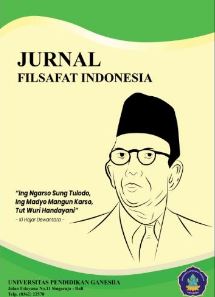Analysis of the Condition of Knowing About Knowledge and Its Implementation in 21st Century Education
DOI:
https://doi.org/10.23887/jfi.v6i3.58735Keywords:
knowing, propositional knowledge, 21st century educationAbstract
Knowing is the most specific thought process and knowledge is the result. The branch of philosophy that examines the nature and theory of knowledge is called epistemology. The condition of knowing about knowledge needs to be analyzed so that it can be the basis for someone claiming a proposition as knowledge. A realistic question for the 21st century is what knowledge is most important for students and teachers to develop 21st century skills. The research method used is library research. The research was conducted by analyzing books, scientific articles, and relevant references related to the philosophy of knowledge and education in the 21st century. The results of the analysis provide information and meaning regarding the condition of knowing about knowledge and its implementation in the 21st century, including: 1) the variety of knowing consists of knowing that ( propositional knowledge), knowing how (practical/tacit knowledge), knowing will (aquitance), and knowing why; 2) proportional knowledge is formed based on the Justified True Belief (JTB) Condition formula; 3) data and information are two important and fundamental things in forming knowledge; and 4) there are three main categories of knowledge as the basis for 21st century learning, namely foundational knowledge (to know), meta knowledge (to act), and humanistic knowledge (to value).
References
Cahyono, A. E., Studi Ilmu Keperawatan, P., Tinggi Ilmu Kesehatan Husada Jombang, S., Korespondensi, A., Veteran Mancar, J., Peterongan, K., Jombang, K., & Timur, J. (2019). Pengetahuan; Artikel Review. Jurnal Keperawatan, 12(1), 13–13.
Ananiadou, K., & Claro, M. (2009). 21st Century Skills and Competences for New Millennium Learners in OECD Countries. OECD Education Working Papers, 41, 33. https://doi.org/10.1787/218525261154.
Bolisani, E., & Bratianu, C. (2018). The Elusive Definition of Knowledge. Knowledge Management and Organizational Learning, 4, 1–22. https://doi.org/10.1007/978-3-319-60657-6_1.
Frické, M. (2008). The Knowledge Pyramid: a Critique of the DIKW Hierarchy, 35(2), 131–142. https://doi.org/10.1177/0165551508094050.
Jenkins, H., Clinton, K., Purushotma, R., Robison, A. J., & Weigel, M. (2009). Confronting the Challenges of Participatory Culture : Media Education for the 21 Century. MacArthur, 21(1), 129.
Johansson, L.-G. (2016). Springer Undergraduate Texts in Philosophy Philosophy of Science for Scientists. http://www.springer.com/series/13798.
Karatas, K., & Arpaci, I. (2021). The Role of Self-directed Learning, Metacognition, and 21st Century Skills Predicting the Readiness for Online Learning. Contemporary Educational Technology, 13(3), ep300. https://doi.org/10.30935/CEDTECH/10786.
Kereluik, K., Mishra, P., Fahnoe, C., & Terry, L. (2013). What Knowledge Is of Most Worth: Teacher Knowledge for 21st Century Learning. Journal of Digital Learning in Teacher Education, 29(4), 127–140.
Koehler, M. J., Harvey, D. M., & Caro, R. A. (2017). Handbook of Technological Pedagogical Content Knowledge (TPACK) for Educators. (2nd edition). Routledge. TechTrends 2017 61:4, 61(4), 404–405. https://doi.org/10.1007/S11528-017-0176-2.
Oeberst, A., Kimmerle, J., & Cress, U. (2016). What Is Knowledge? Who Creates It? Who Possesses It? The Need for Novel Answers to Old Questions. Mass Collaboration and Education, 105–124.
Porot, N., Mandelbaum, E. (2019). The Science of Belief: A Progress Report. WIREs Cogn Sci, 12(2), 1-17. https://doi.org/10.1002/wcs.1539
Rescher, & Nicholas. (2003). Epistemology : An Introduction to the Theory of Knowledge.
Shope, R. K. (2005). Conditions and Analyses of Knowing. The Oxford Handbook of Epistemology.
Sutejo, & Susanto, H. (2017). Filsafat Ilmu Telaah Kritis Akan Hakikat dan Cara Kerja Ilmu Pengetahuan.
Turyahikayo, E. (2021). Philosophical Paradigms as the Bases for Knowledge Management Research and Practice. Knowledge Management & E-Learning, 13(2), 209-224. https://doi.org/10.34105/j.kmel.2021.13.012.
Downloads
Published
Issue
Section
License
Copyright (c) 2023 Jurnal Filsafat Indonesia

This work is licensed under a Creative Commons Attribution-ShareAlike 4.0 International License.

Jurnal Filsafat Indonesia Undiksha is licensed under a Creative Commons Attribution-ShareAlike 4.0 International License.




